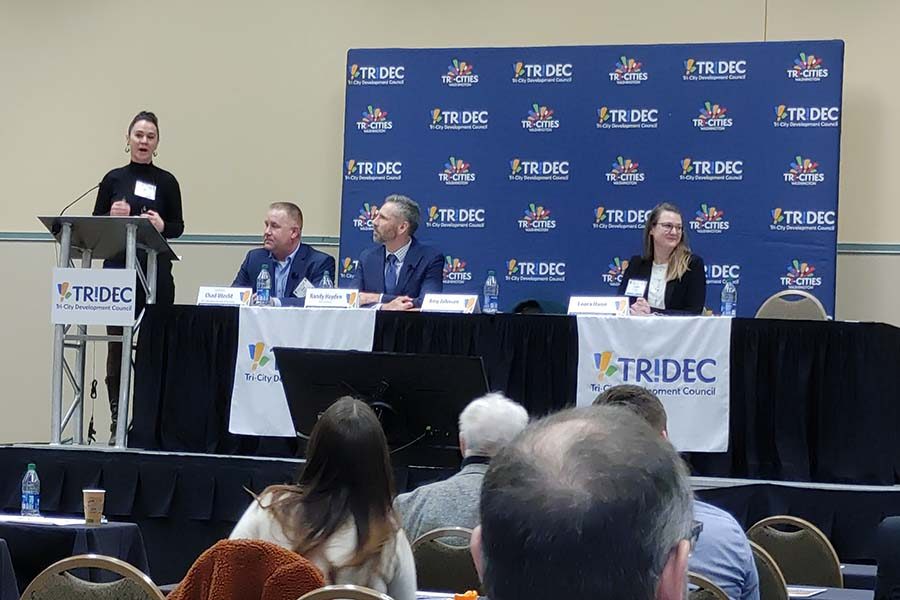
Home » Plans to grow ag innovation center begin to take root
Plans to grow ag innovation center begin to take root

February 13, 2023
Randy Hayden spent two years shepherding the team that wooed Darigold Inc. to spend $500 million to build a state-of-the-art milk processing plant in Pasco, the largest investment in Darigold’s 104-year history.
Work has just started at the site of the future plant, but Hayden, executive director of the Port of Pasco, is already plotting the next big thing for Mid-Columbia agriculture: establishing an Agricultural Innovation Center.
The center would support research and problem solving for one of the most important components of the Mid-Columbia economy: producing food.
The agricultural innovation center is an initiative of the Tri-City Regional Chamber of Commerce’s MyTRI 2030 Agricultural Committee, one of several formed to envision the future for the local economy’s many sectors. Agriculture was worth more than $1.6 billion to Benton and Franklin counties in 2017, according to the most recent U.S. Department of Agriculture’s Census of Agriculture.
The USDA conducted the 2022 census this winter and will report results in 2024. The impact will certainly be greater.
Hayden was named the ag committee chair in January and took over planning for what could be a state-of-the-art research and development facility for all things agriculture.
He outlined the project, still in its infancy, for 300 local business executives on Feb. 1, when the Tri-City Development Council, or TRIDEC, held its annual Economic Outlook in Kennewick.
An ag-focused innovation center could help move Mid-Columbia forward as the world’s need for food and how it is produced adapts to technological and climate change. Agriculture is a stabilizing economic influence on the Tri-City community.
This is the place to ensure it keeps doing that, Hayden said.
“The Tri-Cities is a leader in ag innovation already,” he said.
The effort includes pursuing state funds for a feasibility study and federal grants to support design and construction. No location has been specified.
It would be a collaborative effort involving the private sector, the many commodity groups (grapes, hay, potatoes, wheat and so forth), and the state and federal departments of agriculture.
It would contain labs and so-called makerspaces where ideas could be transformed into reality.
It would provide a gathering spot for the local farming community to get together to talk about their industry, challenges and ideas.
It would also focus on transferring technological innovations into the ag sector.
Hayden cited several models for the region to consider.
The Stepan Agricultural Innovation Center is an industry-sponsored facility in Winder, Georgia, with a focus on sustainable agriculture.
The Lynda and Steward Resnick Center for Agricultural Innovation is being constructed on the campus of University of California, Davis, next to its plant sciences building and its student farm field house.
The 40,000-square-foot California project is supported by a $50 million donation from its namesakes, which includes funds to support research.
Darigold isn’t the only ag operator betting on the Tri-Cities.
Local Bounti Inc., the Montana-based ag tech startup, is making progress on its indoor lettuce plant in Pasco, reports Laura Hann.
Hann, its director of sustainability, joined Hayden along with a representative from Purple Star Winery for the economic outlook’s session on agricultural innovation. Chad Utecht of the Tri-Cities Area Journal of Business and chairman of the West Richland Planning Commission moderated the discussion.
Hann said Local Bounti chose the Tri-Cities for its sunshine, regional workforce, easy access to Seattle, Spokane and Portland. It expects to begin cultivating lettuce in its three-acre greenhouse by the end of the year. It will begin filling management and engineering positions this summer, she said.
“We see the Northwest as a growing hub for indoor agriculture,” Hann said.
The city of Pasco recently approved a $3.5 million permit to begin construction of the company’s 238,660-square-foot greenhouse. Future building additions are included in its plans.
Local News
KEYWORDS february 2023





